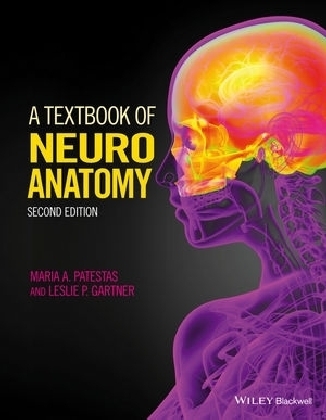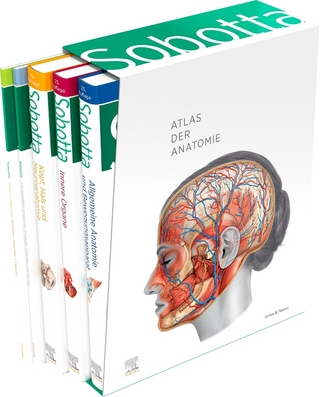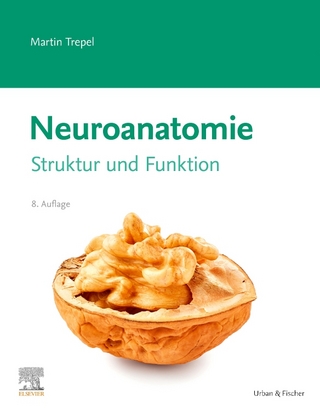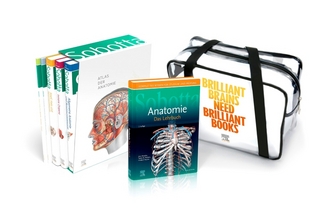
A Textbook of Neuroanatomy
John Wiley & Sons Inc (Verlag)
978-1-118-67746-9 (ISBN)
- Lieferbar (Termin unbekannt)
- Versandkostenfrei innerhalb Deutschlands
- Auch auf Rechnung
- Verfügbarkeit in der Filiale vor Ort prüfen
- Artikel merken
MARIA A. PATESTAS is Professor of Anatomy at Des Moines University in Des Moines, IA, USA. LESLIE P. GARTNER is Professor of Anatomy retired from the Department of Biomedical Sciences at the Dental Schol of the University of Maryland in Baltimore, MD, USA.
Preface viii About the Companion Website x Part I General principles of the nervous system 1 Chapter 1 Introduction to the Nervous System 3 Cells of the Central Nervous System 5 Central Nervous System 5 Peripheral Nervous System 8 Questions to Ponder 9 Chapter 2 Development of the Nervous System 10 Early Development 11 Neurulation 13 Early Development of the Spinal Cord and Brain 18 Development of the Spinal Cord 20 Development of the Brain 22 Synonyms and Eponyms of the Nervous System 29 Questions to Ponder 29 Chapter 3 Histophysiology of the Nervous System 30 Neurons 31 Neuroglia 38 Generation and conduction of Nerve Impulses 42 Synonyms and Eponyms of Nervous System Histopathology 46 Questions to Ponder 46 Chapter 4 Neurotransmitter substances 47 Classifi cation of Neurotransmitter Substances 50 Questions to Ponder 57 Chapter 5 Spinal cord 58 Morphology of the Spinal Cord 59 Internal Morphology of the Spinal Cord 65 Vascular Supply of the Spinal Cord 68 Synonyms and Eponyms of the Spinal Cord 72 Questions to Ponder 72 Chapter 6 Gross Anatomy of the Brain 73 Cerebrum 74 Diencephalon 85 Cerebellum 86 Brainstem 89 Synonyms and Eponyms of the Brain 94 Questions to Ponder 94 Chapter 7 Brainstem 95 Internal Organization of the Brainstem 95 Medulla 99 Pons 105 Midbrain 110 Synonyms and Eponyms of the Brainstem 119 Questions to Ponder 119 Chapter 8 Meninges and Cerebrospinal Fluid 120 Cranial Meninges 121 Spinal Meninges 128 Venous Sinuses of the Cranial Dura Mater 129 Cerebrospinal Fluid 133 Ventricles of the Brain 133 Synonyms and eponyms of the Nervous System 135 Questions to Ponder 135 Chapter 9 Vascular Supply of the Central Nervous System 136 Vascular Supply of the Spinal Cord 137 Arterial Supply of the Brain 138 Venous Drainage of the Brain 151 Synonyms and Eponyms of the Vascular Supply of the Central Nervous System 155 Questions to Ponder 155 Chapter 10 Autonomic Nervous System 156 Sympathetic Nervous System 159 Parasympathetic Nervous System 166 Enteric Nervous System 169 Neurotransmitters and Receptors of the Autonomic Nervous System 170 Pelvic Autonomic Functions 171 Synonyms and Eponyms of the Autonomic Nervous System 174 Questions to Ponder 174 Chapter 11 Spinal Reflexes 175 Components of Reflexes 175 Lower Motoneurons 176 Skeletal Muscle Innervation 177 Skeletal Muscle Receptors 177 Muscle Stretch Reflex 179 Reciprocal Inhibition 179 Autogenic Inhibition (Inverse Myotatic Reflex) 180 Flexor Reflex (Withdrawal Reflex, Nociceptive Reflex) 180 Crossed Extension Reflex 181 Maintenance of Muscle Tone via the Gamma Loop 181 Alpha-Gamma Coactivation 182 Synonyms and Eponyms of the Spinal Reflexes 184 Questions to Ponder 184 Part II Integrative Components of the Nervous System 185 Chapter 12 Ascending sensory Pathways 187 Sensory Receptors 188 Anterolateral System 197 Tactile Sensation and Proprioception 207 Sensory Pathways to the Cerebellum 212 Modulation of Nociception 224 Neuroplasticity 226 Synonyms and Eponyms of the Ascending Sensory Pathways 226 Questions to Ponder 227 Chapter 13 Motor Cortex and Descending Motor Pathways 228 Cortical Areas Controlling Motor Activity 229 Descending Motor Pathways 231 Synonyms and Eponyms of the Motor Cortex and Descending Motor Pathways 248 Questions to Ponder 249 Chapter 14 Basal Nuclei 250 Components of the Basal Nuclei 251 Nuclei Associated with the Basal Nuclei 255 Input, Intrinsic, and Output Nuclei of the Basal Nuclei 257 Connections of the Basal Nuclei 259 Circuits Connecting the Basal Nuclei, Thalamus, and Cerebral Cortex 265 Other Circuits of the Basal Nuclei 267 Neurotransmitters of the Basal Nuclei 268 Direct and Indirect Loops (Pathways) of the Basal Nuclei 270 Circuits that Modulate Activity of the Basal Nuclei 271 Synonyms and Eponyms of the Basal Nuclei 277 Questions to Ponder 278 Chapter 15 Cerebellum 279 Morphology of the Cerebellum 281 Cerebellar Peduncles 289 Deep Cerebellar Nuclei 291 Afferents (Input) to the Cerebellum 292 Efferents (Output) from the Cerebellum 296 Functional Organization of the Cerebellum: Intrinsic Circuitry 298 Synonyms and Eponyms of the Cerebellum 302 Questions to Ponder 302 Chapter 16 Reticular Formation 303 Morphology of the Reticular Formation 304 Zones of the Reticular Formation 305 Nuclei Associated with the Reticular Formation 307 Input to and Output from the Reticular Formation 307 Functions of the Reticular Formation 308 Synonyms and Eponyms of the Reticular Formation 314 Questions to Ponder 314 Chapter 17 Cranial Nerves 315 Olfactory Nerve (CN I) 320 Optic Nerve (CN II) 320 Oculomotor Nerve (CN III) 321 Trochlear Nerve (CN IV) 323 Trigeminal Nerve (CN V) 325 Abducent Nerve (CN VI) 332 Facial Nerve (CN VII) 336 Vestibulocochlear Nerve (CN VIII) 338 Glossopharyngeal Nerve (CN IX) 339 Vagus Nerve (CN X) 342 Spinal Accessory Nerve (CN XI) 345 Hypoglossal Nerve (CN XII) 346 Synonyms and Eponyms of the Cranial Nerves 348 Questions to Ponder 349 Chapter 18 Visual System 350 Eye 350 Central Visual Pathways 355 Visual Reflexes 365 Synonyms and Eponyms of the Visual System 375 Questions to Ponder 375 Chapter 19 Auditory System 376 Ear 376 Auditory Transmission 381 Central Auditory Pathways 383 Synonyms and eponyms of the Auditory System 391 Questions to Ponder 391 Chapter 20 Vestibular System 392 Vestibular Apparatus 393 Vestibular Nerve (CN VIII) 399 Central Pathways of the Vestibular System 400 Control of Ocular Movements 403 Vestibular Nystagmus 406 Caloric Nystagmus 408 Synonyms and Eponyms of the Vestibular System 409 Questions to Ponder 410 Chapter 21 Olfactory System 411 Olfactory Receptor Cells 412 Olfactory Transduction 412 Olfactory Nerve (CN I) 414 Central Connections of the Olfactory System 415 Synonyms and Eponyms of the Olfactory System 418 Questions to Ponder 419 Chapter 22 Limbic System 420 Limbic Lobe 421 Brainstem Centers Associated with Limbic System Function 432 Pathways of the Limbic System 432 Limbic Association Cortex 435 Limbic System Input to the Endocrine, Autonomic, and Somatic Motor Systems 435 Synonyms and Eponyms of the Limbic System 437 Questions to Ponder 438 Chapter 23 Hypothalamus 439 Borders 440 Hypothalamic Zones and Component Nuclei 441 Hypothalamic Regions (areas) and Component Nuclei 446 Connections of the Hypothalamus 448 Pathways of the Hypothalamus 449 Functions of the Hypothalamus 452 Hypothalamohypophyseal Connections 455 Synonyms and Eponyms of the Hypothalamus 462 Questions to Ponder 463 Chapter 24 Thalamus 465 Borders 465 Anatomy 467 Internal and External Medullary Laminae 468 Thalamic Nuclei 469 Synonyms and Eponyms of the Thalamus 477 Questions to Ponder 478 Chapter 25 Cerebral Cortex 479 Cells of the Cerebral Cortex 481 Types of Cortex 483 Cell layers of the Neocortex 484 Vertical Columnar Organization of the Cerebral Cortex 485 Afferents (Input) to the Cerebral Cortex 485 Efferents (Output) from the Cerebral Cortex 486 Internal Capsule and Corona Radiata 489 Lobes of the Cerebral Cortex 489 Functional Organization of the Cerebral Cortex 490 Cerebral Dominance 498 Synonyms and Eponyms of the Cerebral Cortex 504 Questions to Ponder 506 Questions to Ponder: Answers to Odd Questions 507 Index 517
| Verlagsort | New York |
|---|---|
| Sprache | englisch |
| Maße | 212 x 287 mm |
| Gewicht | 1392 g |
| Einbandart | kartoniert |
| Themenwelt | Medizin / Pharmazie ► Medizinische Fachgebiete ► Neurologie |
| Studium ► 1. Studienabschnitt (Vorklinik) ► Anatomie / Neuroanatomie | |
| Naturwissenschaften ► Biologie | |
| ISBN-10 | 1-118-67746-3 / 1118677463 |
| ISBN-13 | 978-1-118-67746-9 / 9781118677469 |
| Zustand | Neuware |
| Informationen gemäß Produktsicherheitsverordnung (GPSR) | |
| Haben Sie eine Frage zum Produkt? |
aus dem Bereich


